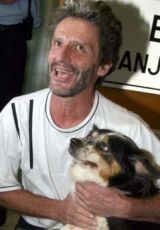Slovenia’s Kriznar backs home after jail in Sudan’s Darfur
Sept 5, 2006 (LJUBLJANA) — It was a triumphant day for Slovenian diplomacy on Tuesday as Tomo Kriznar, the human rights activist who became President Janez Drnovsek’s envoy for Darfur, returned to Slovenia after spending more than a month and a half in a Sudanese prison on spying charges.
 Kriznar arrived at Ljubljana International Airport at Brnik on Tuesday morning, accompanied by the two men who were dispatched to Sudan to get him out of prison – Slovenian consul to Egypt Andrej Dernovscek and President Drnovsek’s representative Hamdija Blekic, the Slovenian STA agency reported.
Kriznar arrived at Ljubljana International Airport at Brnik on Tuesday morning, accompanied by the two men who were dispatched to Sudan to get him out of prison – Slovenian consul to Egypt Andrej Dernovscek and President Drnovsek’s representative Hamdija Blekic, the Slovenian STA agency reported.
His arrival comes less than a day after he was released from the prison in Al Fasher capital of Sudan’s North Darfur, where he had been held for the last 47 days before being granted a pardon from Sudanese President Omar al Beshir.
Although tired, Kriznar said he was feeling well and was glad to be able to see his family and friends.
In his first statement following his arrival in Slovenia, Kriznar said that the clemency granted by al Bashir was a sign that the situation in Sudan was turning for the better.
Kriznar explained that he had been treated well in prison and that he even got a chance to establish contacts with imprisoned members of the Janjaweed militia during his imprisonment. “They took me as their own,” he said.
Although happy to be back, Kriznar found it difficult to leave behind the photos and film material from his stay in the western Sudanese region of Darfur that were seized by Sudanese authorities at the time of his arrest.
Before leaving Sudan on Monday Kriznar said he would not quit the country without his photos. He told the Slovene TV “there are 5,000 digital photos in my computer and many hours of video footage from the places where there were no reporters, no foreigners. I do not want to lose that”.
He hopes that he will be able to get them back and says that his arrest in Sudan may have something to do with the fact “that some people were afraid I was investigating mass graves too much”.
Meanwhile, Kriznar’s release was greeted by both President Drnovsek and Foreign Minister Dimitrij Rupel. At their respective press conferences on Tuesday, the officials were quick to put recent differences over Kriznar’s fate behind them.
While Rupel stressed that Kriznar’s release was a result of efforts of the ministry at all levels over the last month and a half, he also acknowledged Drnovsek’s role, particularly the letter he sent to Al Bashir.
Drnovsek dodged media questions about who deserved the most credit for Kriznar’s release, instead saying that the most important thing was having Kriznar home again.
The president also denied speculations that he bore part of the blame for Kriznar’s situation in Sudan and was also backed up by Kriznar as he explained that “Tomo embarked on this mission voluntarily and with humanitarian objectives”.
“In this project we all had and still have only the best intentions – to help the people of Darfur,” Drnovsek added. The president had made Kriznar his envoy when he launched his efforts for peace in the war-ravaged region of Darfur.
According to Andrej Ster, the head of the Foreign Ministry’s directorate for international law, the “costs of the entire operation will be less then EUR 30,000”, which was the budget assigned to consul Dernovscek.
Kriznar was arrested in late July after entering Sudan without a visa. He was accused of spying, illegal entry into Sudan and spreading lies about the Sudanese government and people.
He was sentenced to two years in prison and a fine of EUR 2,000 on 14 August. The court also seized his computer, camera and satellite phone with footage about the situation in Darfur.
(ST)
